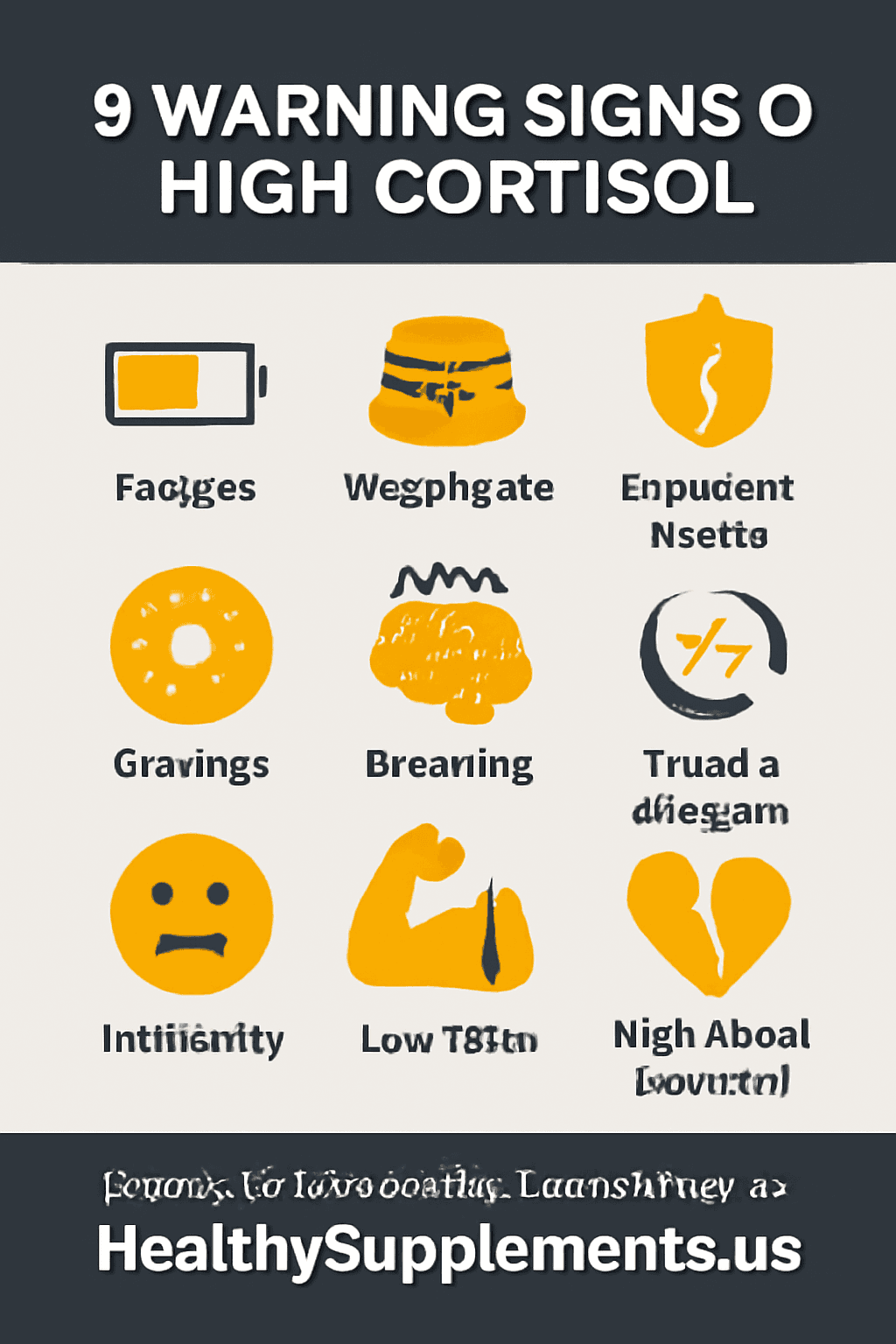
Infographic displaying 9 key warning signs of high cortisol levels in an easy-to-read grid format—helping readers identify cortisol-related health issues.
9 Symptoms of High Cortisol You Shouldn’t Ignore
Key Takeaways
- Your body sends clear warning signs when your stress hormone is out of balance. Recognizing these **symptoms of high cortisol** is crucial for your long-term health.
- Common signs include unexplained weight gain (especially belly fat ), constant fatigue, poor sleep, brain fog, and frequent illness.
- These symptoms are not just in your head; they are physiological responses to the hormone imbalance caused by chronic stress.
- Ignoring these signs can lead to more serious health problems down the line.
- Lifestyle changes and targeted adrenal support can help you manage these symptoms and restore balance.
Warning Signs to Watch For
Introduction: Is Your Body Sending an SOS?
>>Do you feel like you’re constantly running on empty, no matter how much you rest? Do you struggle with brain fog and find it harder to focus? Have you noticed weight creeping on, especially around your middle, that just won’t budge? These aren’t random signs of aging or a busy life; they are classic **symptoms of high cortisol**.<<<
Your body has a sophisticated way of communicating when something is wrong. As we’ve discussed, chronic stress affects cortisol levels dramatically, forcing your body into a constant state of emergency. Learning to read these signals is the first and most important step you can take toward reclaiming your health, energy, and well-being. Ignoring them is like ignoring the check engine light in your car—it only leads to bigger problems later.
The Top 9 Symptoms of High Cortisol
If you’re experiencing several of the following, it’s a strong indicator that your cortisol levels may be out of balance. Here are the key **symptoms of high cortisol** to watch for:
- Persistent Fatigue: This isn’t normal tiredness. It’s a deep, bone-weary exhaustion that sleep doesn’t seem to fix. You might feel “wired but tired,” especially at night.
- Weight Gain, Especially “Cortisol Belly”: You’re gaining weight without a major change in diet or exercise, and it’s accumulating around your abdomen. High cortisol promotes the storage of visceral fat, which is particularly dangerous.
- Frequent Illness: Are you catching every cold that goes around? High cortisol suppresses the immune system, leaving you vulnerable to infections.
- Cravings for Unhealthy Foods: Your body is screaming for quick energy, leading to intense cravings for sugary, salty, and fatty foods, which only exacerbates the problem.
- Brain Fog & Poor Concentration: You find it hard to focus, make decisions, or remember things. This is a direct result of cortisol’s impact on the brain’s prefrontal cortex.
- Sleep Problems: You either have trouble falling asleep because your mind is racing, or you wake up frequently around 2-3 AM and can’t get back to sleep. This is a classic sign of a disrupted cortisol rhythm.
- Irritability, Anxiety, or Depression: Cortisol directly affects the neurotransmitters that regulate mood. Feeling constantly on edge, anxious, or down can be a key hormonal symptom.
- Muscle Weakness and Aches: Cortisol is a catabolic hormone, meaning it can break down muscle tissue for energy, leading to feelings of weakness and unexplained aches and pains.
- Low Libido: When your body is in survival mode, functions like reproduction are put on the back burner. High cortisol often leads to a decreased interest in sex.
What to Do If You Recognize These Symptoms
Recognizing yourself in the list above can be alarming, but it’s also empowering. Now that you can name the problem, you can start to address it. The path to rebalancing your cortisol involves a proactive, holistic approach.
- Confirm Your Levels: While these **symptoms of high cortisol** are strong indicators, consider getting tested to confirm. You can learn more about your options in our upcoming guide, “How to Test Your Cortisol Levels.”
- Implement Lifestyle Changes: Start with the fundamentals: prioritize sleep, engage in moderate exercise, and practice daily stress-reduction techniques like meditation or deep breathing.
- Seek Targeted Support: For many, breaking the cycle requires more direct intervention. Supporting your body’s adrenal system with high-quality adaptogens can be a game-changer.
A Science-Backed Approach to Managing Symptoms
If you’re experiencing these **symptoms of high cortisol**, you need a reliable solution. A supplement like **CortiSync** is specifically designed to address the root cause by helping to regulate the body’s stress response. Its formula, centered around the clinically-studied Sensoril®, provides targeted support to help lower cortisol, which in turn can alleviate these debilitating symptoms and help you feel like yourself again.
Find Balance and Reclaim Your Energy with CortiSync
For a complete overview of the best solutions available, read our pillar article on the best supplements for cortisol.
Frequently Asked Questions
What are the first signs of high cortisol?
The first symptoms of high cortisol are often persistent fatigue, feeling ‘wired but tired,’ and difficulty sleeping. Many people also notice increased cravings for unhealthy foods and initial changes in their mood, such as heightened irritability.
Can high cortisol cause belly fat?
Yes, absolutely. One of the most common symptoms of high cortisol is the accumulation of visceral fat around the abdomen, often referred to as ‘cortisol belly.’ This is because cortisol promotes fat storage in this specific area.
How can I know for sure if my cortisol is high?
While recognizing the symptoms of high cortisol is a good first step, the only way to know for sure is through testing. You can talk to your doctor about lab tests or use at-home saliva or blood spot tests to measure your cortisol levels.
These statements have not been evaluated by the Food and Drug Administration. This product is not intended to diagnose, treat, cure, or prevent any disease. Results may vary. Always consult with a healthcare professional before starting any new supplement regimen.
Last reviewed: July 2025









